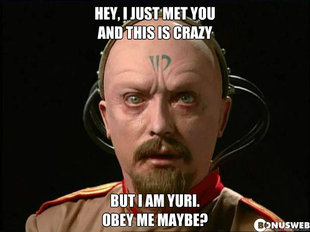To the Fifteen (now Thirteen) Colonies:
I got what I came for, and I figure you'll have enough of a handful with Bengal. How 'bout a white peace?
Thirteen Colonies:
Sure, take it. We are way too concerned of Bengal to start a war on two fronts.
Bengal, After a Good Drink [Non-Canon]:
It's okay, Confederates. We promise your death will be painless.
For the glory of internationalism!
Prussia
Dialoglog said:
Prussia notes that as a middle of the road observer, Germany and Airstrip One took up arms against the Soviets by joining the war on the Partitionanian side. Akin to foreign volunteers, there was the risk the USSR would attack them.
The only armed force that can say it is humanitarian with a straight face is the UNPC. That force has an international mandate wherever it is placed, and an attack upon it is akin to an attack on all nations.
Germany and Airstrip One, remnants of the fallen London state, clearly have a dislike for the USSR and thus reinforced the ranks of the Partitionanians.
Madagascar embargoes the Soviet Union because it is politically expedient to do so.
Prussia appreciates Hitler's honesty!
Their recent attacks against neutral third party forces demonstrate them to be a country without honour.
As mentioned above, to call the German and Airstrip One forces "neutral" is laughable. When individuals sign up in foreign wars, are they "neutral?" No, they are armed combatants just as much.
Had the Germans and Airstrip One nationals been civilians and providing humanitarian aid, we would resoundly join the international community in their demise. But they were armed men, digging in with the Finno-Poles to protect their territories.
To claim any obligation to their defence is at best appeasement, at worst, collusion.
The Prussian state values honor as much as valor. Our treaty commitments state that we have a defensive alliance with the Soviets. Nothing more, nothing less.
As such, we are not committed to helping their annexation of Partitionania. That war is a Soviet and Finno-Pole affair, not a Prussian one. It is also a war of aggression, clearly not under our charter. You are right in that they did not present very detailed evidence of Finno-Pole wrongdoing; ergo, we do not class it as a defensive war.
However, as the Partitionanians had resigned their alliance obligations, the Western Allies of America, the Empire of China, London, Rome and Hungary had no legal reason to assist the Finno-Poles, and attacked the USSR. This is where our own treaty obligations activated: while we will not help the USSR against Partitionania (as our alliance is, again, defensive), we will help them repel any attempts at third party intervention.
With the Soviet, Swedish and Anatolian fleets, we have successfully established control of the Baltic. Prussia does not seek large-scale conflict, but its fleet will ensure that third parties do not come within a hundred kilometers of St. Petersburg. As far as Prussian foreign policy is concerned, Partitionania and the USSR should be left alone in their corner of the world until this war is finished.
Partitionania had advance warning of a Soviet attack based on the latter's buildup. The savvy thing to do would have been to seek out some sort of alliance - even with us.
==The Blood-Soaked Bayou: Louisiana from 3005 to 3014==
Michael Portier took office on January 21, 3006, the departing Masters Administration having already heard of a potential uprising in the eastern counties. Sure enough, a descendant of a well-to-do French immigrant family had taken on the name "Napoleon X," and proclaimed the Fifth French Empire. Those who had always wanted a more active, glorious foreign policy swiftly rallied behind him, with one-third of the country soon in revolt.
Due to the libertarian nature of the state, there was much controversy in suppressing the rebellion. Did libertarianism not value states' rights? If there was such a large following behind Napoleon, shouldn't his followers have been allowed to hold elections to secede?
Portier, however, was well aware of the issues ideology posed. Given that a war declaration would need to be put up to popular vote, he needed to convince ordinary folk to say aye. So, he tasked his best strategists with finding a plan that could convince the public Napoleon was a menace. Within two weeks, they had one.
Firstly, Napoleon was a monarchist, and thus inherently believed that some individuals were better than others by merit of birth. The many moderates who weren't as radically in favor of local sovereignty took warm to this idea, as it was contrary to the idea of every individual being the sum of their past labor. Second, Napoleon's uprising would drastically weaken the Louisiana economy, making it that much more vulnerable to outside pressure. If Louisiana did not sacrifice some principles of local autonomy and suppress Napoleon, both sides would be at risk of rising powers like Katterland, the 501st, London and others forcing their will down the Bayou Republic's throats. Thirdly, through the laying of traps, Portier made it seem as if Napoleon had fired on them first. Akin to the Civil War's outbreak, this sealed many's opinions in favor of crushing the uprising.
When all was over, the uprising was surprisingly not too costly. Only tens of thousands of civilians and a few thousand soldiers had perished, much lower than what others had expected. Napoleon fled into the wilderness, and the Republic endured.
It was not without cost, however. The conflict had destroyed much of the military, with many forces having defected to Napoleon. It would need swift rebuilding to deter aggression.
Portier was up to the task. While the government of the Republic was very weak and decentralised, with direct democracy deciding every issue, stability and pragmatism had allowed the President to employ a cabinet of advisors to draft proposals that the People would vote on. The Bayou Presidency's strength was dependent not on party majorities or discipline, but how intelligent, cunning and convincing a President was in promoting his policies.
In foreign policy, Portier made no changes. Though the bayou folk admired the states of Somalia and the 501st, they remained adamantly opposed to tangling alliances. Portier continued to vote for weakening the Union of Nations. On the European War, he said it was just that: European. Even when the fellow libertarians in the 501st came under assault, he remained adamantly opposed to intervention, and so did many of his people. With the 501st being relatively far away, with wastes separating it from the Bayou Republic, impetus to intervene declined.
Portier argued that the military would need expansion, and need it soon. If the navy did not become stronger, there would be nothing guarding against an aggressor. If the army did not expand, acquisition of new lands would slow. If the air force did not expand, there'd be nothing to stop the increasingly-larger air armadas of the world from bombing to oblivion all Louisiana had worked so hard to create.
Most importantly, however, he argued for more active economics. Through a series of charts and data in one-on-one televised sessions, he showed the benefits of government investment. He pointed to how sluggishly far behind the Bayou was compared to its predecessors. He proposed a series of loans and grants to small businesses, and tax reductions. Tariffs would be raised to foster domestic industry's growth, and taxes would be gradually lowered so as to attract more investment into the country. While some of his more Keynesian policies remained controversial, they nonetheless passed. The state was given the green light to spend tax money on an economic revitalisation program.


 I must have just missed it. Repatriated.
I must have just missed it. Repatriated. 














